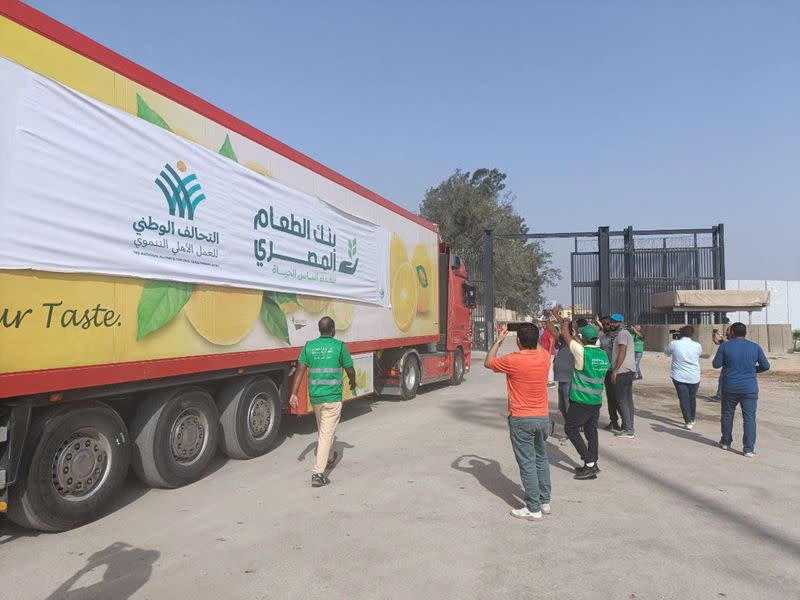UN food chief criticizes strict Rafah crossing checks for limiting Gaza aid
By Simon Lewis
WASHINGTON (Reuters) -Overly stringent checks on trucks at the Rafah crossing from Egypt into Gaza were slowing the flow of humanitarian aid to a "dribble" as hunger grows among Palestinians there, U.N. World Food Programme (WFP) Executive Director Cindy McCain told Reuters on Thursday.
The Rafah crossing, which is controlled by Egypt and does not border Israel, has become the main point of aid delivery since Israel imposed a "total siege" of Gaza in retaliation for an attack by Hamas militants from the coastal strip on Oct. 7.
The United States is leading negotiations with Israel, Egypt and the U.N. to try to create a sustained delivery mechanism for aid to Gaza. They are wrangling over procedures for inspecting aid and bombardments on the Gaza side of the border.
"We’ve gotten a few – a dribble, just a dribble – of trucks in," McCain said in an interview. "We need to get a large amount in. We need safe, unfettered access into Gaza so that we can feed and make sure that people don’t starve to death, because that’s what’s happening."
While there have been some limited deliveries of food, water and medicine since Saturday, no fuel has been allowed in. Israel is concerned about the possible diversion of fuel deliveries by Hamas.
Three WFP trucks carrying about 60 tons of food - enough to feed 200,000 people for a day - entered Gaza on Saturday. One additional WFP truck has crossed since then, according to the agency.
The Palestinian Red Crescent said on Thursday it had received 74 aid trucks.
The daily average of trucks allowed into Gaza prior to the hostilities was about 500, U.N. spokesperson Stephane Dujarric said on Thursday.
The U.N. agency providing aid to Palestinian civilians, UNRWA, has almost exhausted its fuel reserves and has begun significantly reducing its operations, he said.
McCain, who visited Egypt and met with officials, said each truck has to offload its cargo at a checkpoint for inspection, then reload it when the check is complete.
"The bureaucracy is insane," McCain said, adding that while she understood checks were needed to ensure arms and ammunition were not being smuggled, it should be easier to get food in.
The government of Egypt did not immediately respond to a request for comment.
U.S. officials, including Special Envoy David Satterfield, who is in the region, are working to improve the process, State Department spokesperson Matthew Miller told reporters on Thursday.
"We need to speed up the inspection regime, and we're working to do that," Miller said.
WFP needs to raise $100 million to feed over a million people in Gaza to the end of this year, McCain said, amid a wider crisis in funding humanitarian aid caused by multiple emergencies around the world, rising food prices due to Russia's war in Ukraine and what McCain called "donor fatigue."
In Washington to meet with U.S. officials and lawmakers, McCain said she has heard concerns that aid could be diverted by Hamas militants, but said WFP has systems in place to make sure aid gets to those who need it.
"It's a war zone. Things are going to happen. And so I can't say 100% that nothing's going to wind up in the hands of the bad guys. But we will do everything in our power to make sure it doesn't," she said.
(Reporting by Simon Lewis; additional reporting by Aidan Lewis and Michelle Nichols; editing by Grant McCool and Jonathan Oatis)



